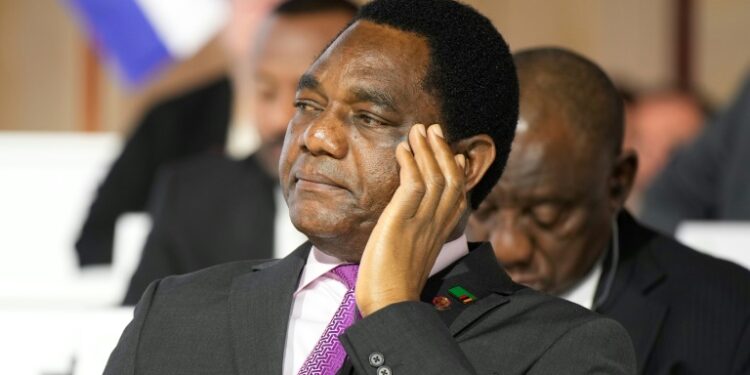Beijing (AFP) – Zambia’s President Hakainde Hichilema will begin an official visit to China on Sunday, as the heavily indebted African nation works to secure financial relief after a restructuring agreement reached in June.
Hichilema has enjoyed an increasingly close relationship with the United States, with President Joe Biden hailing his commitment to democracy at successive US-Africa and democracy summits.
But China is Zambia’s leading creditor and holds huge stakes in its mining sector.China has launched a major infrastructure drive, including new airports, roads, factories, stadiums and energy projects.
“At the invitation of President Xi Jinping, President Hakainde Hichilema…will pay a state visit to China from September 10-16,” foreign ministry spokeswoman Hua Chunying announced on Friday.
Zambia, whose total debt amounted to $32.8 billion at the end of 2022, defaulted on its $18.6 billion foreign debt in 2020 at the height of the Covid-19 pandemic.
A restructuring deal involving foreign lenders and covering about a third of the tab was struck in late June following a two-day Paris summit hosted by French President Emmanuel Macron.
President Hichilema, elected in 2021 on the promise of shoring up the country’s buckling economy, has called the agreement a “significant milestone in our journey towards economic recovery (and) growth”.
Foreign ministry spokeswoman Mao Ning said Friday that China had made “important contributions” to Zambia’s debt resolution efforts.
“Recently, with joint efforts made by all parties of the Zambian creditors committee, work towards Zambia’s debt resolution has made important phased progress, and China made important contributions,” Mao told a press briefing.
“We will continue to maintain close communication with all parties of the debt committee to jointly advance follow-up work.”
Ahead of Hichilema’s trip to China, he spoke by telephone with Samantha Power, the administrator of the US Agency for International Development, who renewed the United States’ commitment to Zambia.
Power and Hichilema discussed “efforts by Zambia and USAID to unlock economic opportunities for the people of Zambia and across the sub-region”, USAID spokeswoman Jessica Jennings said.
Power highlighted US investment in the Lobito Corridor, a major rail project that will link landlocked Zambia to the sea through the Democratic Republic of Congo and Angola.
In a topic unlikely to be discussed in Beijing, USAID said Power and Hichilema also spoke about threats to democracy following a series of military takeovers in Africa.
Zambia is the second-biggest producer of copper in Africa after the DRC, and the seventh-largest producer in the world.
But a sharp decline in copper prices, weaker exports to China and a clampdown on foreign influence in the mining sector have sapped investor confidence in the sector.










